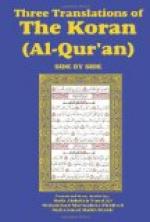2 See Sura lxviii. I, p. 32. Golius conjectured that these letters represent coh ya’as, thus he counselled, and that they were added by some Jewish scribe. Sprenger (Journ. of As. Soc. of Bengal, xx. 280) arranges them as Ain, Sad, Kaf, Ha, Ya, and supposes them to be taken from the Arabic words for Aisa (Jesus) of the Nazarenes, King of the Jews. But we can hardly imagine that Muhammad would ascribe such a title to our Lord, and the word which Dr. Sprenger uses for Jews is not the form peculiar to the Koran.
3 Lest they should desert the worship of the God of Israel.
4 Ar. Yahia. It may be true that the name in this form had never been given. Otherwise, we have in this passage a misunderstanding of Luke i. 61, as well as ignorance of the Jewish Scriptures. Comp. 2 Kings xxv. 23; 1 Chron. iii. 16; Ezra viii. 12; Jerem. xl. 8. Some commentators try to avoid the difficulty by rendering samiyan, deserving of the name.
5 Or, with firm resolve. See Sura [xcvii.] iii. 36. The speaker is God.
6 To an eastern chamber in the temple to pray. Or it may mean, to some place eastward from Jerusalem, or from the house of her parents.
7 Thus the Protev. Jac. c. 12 says that Mary, although at a later period, [greek text] But Wahl, she laid aside her veil.
8 Gabriel.
9 See Sura [lxxxix.] vi. 9.
10 It is quite clear from this passage, and from verse 36, that Muhammad believed Jesus to have been conceived by an act of the divine will. Comp. Sura [xcvii.] iii. 52; see also note at Sura [xci.] ii. 81.
11 Or, the throes urged her to the trunk of, etc.
12 This was either the Infant which spoke as soon as born, or Gabriel. Comp. Thilo Cod. Apoc. 136-139 on this passage. Beidhawi explains: from behind the palm tree.
13 See Thilo Cod. Apoc. N. T. p. 138, and the Hist. Nat. Mar. c. 20, which connects similar incidents with the flight into Egypt. Thus also Latona, [greek text], Call. H. in Apoll. and [greek text], H. in Delum.
14 Or, settle, calm thine eye, refresh thine eye. The birth of a son is still called korrat ol ain.
15 The anachronism is probably only apparent. See Sura iii. 1, n. Muhammad may have supposed that this Aaron (or Harun) was the son of Imran and Anna. Or, if Aaron the brother of Moses be meant Mary may be called his sister, either because she was of the Levitical race, or by way of comparison.
16 See Sura [cxiv.] v. 109.
17 From the change in the rhyme, and from the more polemical tone of the following five verses, it may be inferred that they were added at a somewhat later period.
18 The title Nabi, prophet, is used of Abraham, Isaac, and Jacob, as depositaries of the worship of the one true God, but with a mission restricted to their own families; whereas Houd, Saleh, Shoaib, etc., are designated as (Resoul) apostles and envoys, charged with a more extended mission to the tribes of Arabia. In Moses, Jesus, and Muhammad, etc., are united the office and gift both of prophet (nabi) and apostle (resoul).




